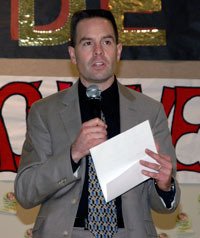MARYSVILLE — The Totem Middle School cafeteria was packed on the evening of Nov. 17, as area residents heard from representatives of the city of Marysville, the Snohomish County Health District and the Washington Environmental Council on “The Coal Hard Truth” about the potential coming of coal trains through Marysville.
Nicole Keenan of the Washington Environmental Council opened by explaining that uncovered rail cars lose about 1 percent of their coal load in transit, due to the amount of coal that’s fine particulate matter, which she pointed out can add up to millions of tons of coal that can get into people’s lungs. She added that the Gateway Pacific coal terminal proposed by SSA Marine, in partnership with Peabody Energy, for Cherry Point in Bellingham could export 48 million tons of coal per year, the largest load in North America.
“It threatens quality of life, tourism and small business to have mounds of coal on the waterfront,” Keenan said. “It threatens the economy because the coal market is volatile. Portland and Los Angeles invested in coal terminals that flopped with the market, and the price of coal has been dropping recently.”
Marysville Mayor Jon Nehring objected to the potential addition of 18 coal trains a day to the train tracks that bisect Marysville from north to south, which he noted would further impede the east-west traffic within the city, as well as access to I-5. He and several other mayors throughout the region wrote letters to the governor asking the state Department of Ecology to get involved. As a result of DOE and the U.S. Army Corps of Engineers planning to review the process, all the applicants’ paperwork must be resubmitted, which adds a couple of years to the timeline.
“Economic impacts are where this battle will be played out,” said Nehring, who cited the burdens placed on workers, businesses, schools and emergency responders by making the city more difficult to traverse with extra trains. “Right now, it’s cheaper for the Chinese to import coal than to transport it from parts of their own country, but as their infrastructure gets built up, that’s not likely to last. A lot of state and federal leaders support this coal terminal, but if they saw all of you here, they’d think twice. Phone calls and letters from you carry much more weight with them than phone calls and letters from me.”
Gary Goldbaum of the Snohomish County Health District listed the health impacts of coal particulates, whose heavy metals can be absorbed by the lungs and the skin to contribute to asthma and heart attacks, as well as of the additional noise level of the trains, which can raise blood pressure. He likewise noted that slowed or stopped automobile traffic “can make the difference between life and death” for ambulance passengers.
Dean Smith of Transition Port Gardner asserted that such coal trains constitute an “immoral” practice due to three factors:
1. The externalization of the coal industry’s costs.
2. The shipping of energy across long distances.
3. The creation of more carbon dioxide in the atmosphere.
“We’re paying for the coal industry to remain profitable,” Smith said. “The added wait times at railroad crossings, which would be two hours a day with 18 trains a day, doesn’t add to our convenience.”
Smith cited three lawsuits by the Burlington Northern Railroad against coal companies for the derailment of their trains, since coal particulates also escape from the bottom of rail cars and add to the dust under the beds of railroad tracks, eventually forcing the rails out of alignment.
Organizers of this forum invited attendees to a follow-up meeting on Dec. 1 from 6-8 p.m. at Firewheel Books & Beans, located at 2820 Oakes Ave. in Everett. To RSVP or for more information, email Seth.Ballhorn@sierraclub.org.



